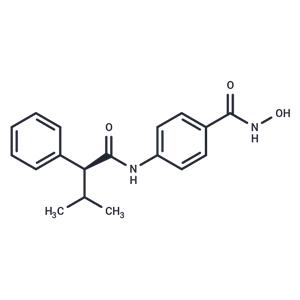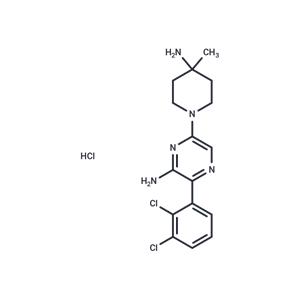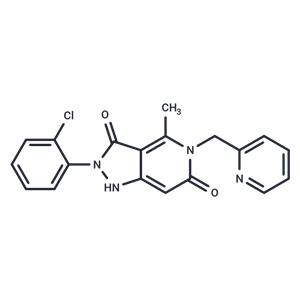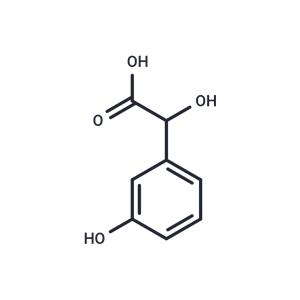
AR42 NEW
| Price | $34 | $77 | $129 |
| Package | 1mg | 5mg | 10mg |
| Min. Order: | |
| Supply Ability: | 10g |
| Update Time: | 2024-11-19 |
Product Details
| Product Name: AR42 | CAS No.: 935881-37-1 |
| Purity: 98.96% | Supply Ability: 10g |
| Release date: 2024/11/19 |
Product Introduction
Bioactivity
| Name | AR42 |
| Description | AR42 (OSU-HDAC42) is an HDAC inhibitor (IC50: 30 nM). |
| Cell Research | Concentrations: Dissolved in DMSO,final concentrations ~2.5 μM. Method: DU-145 Cells are exposed to various concentrations of AR-42 for 96 hours.The medium is removed and replaced by 150 μL of 0.5 mg/mL of MTT in RPMI 1640 medium,and the cells are incubated in the CO2 incubator at 37 °C for 2 hours.Supernatants are removed from the wells,and the reduced MTT dye is solubilized with 200 μL/well of DMSO.Absorbance is determined on a plate reader at 570 nm. |
| Kinase Assay | In vitro HDAC assay:HDAC activity is analyzed by using an HDAC assay kit. This assay is based on the ability of DU-145 nuclear extract, which is rich in HDAC activity, to mediate the deacetylation of the biotinylated [3H]-acetyl histone H4 peptide that is bound to streptavidin agarose beads. The release of [3H]-acetate into the supernatant is measured to calculate the HDAC activity. Sodium butyrate (0.25-1 mM) is used as a positive control. |
| Animal Research | Animal Models: Intact male NCr athymic nude mice inoculated s.c.with PC-3 cells. Formulation: Formulated in methylcellulose/Tween 80. Dosages: ~50 mg/kg/day. Administration: p.o. |
| In vitro | AR-42 induces p21WAF/CIP1 overexpression and histone hyperacetylation and inhibits the growth of DU-145 cells (IC50 of 0.11 μM) [1]. AR-42 is effective in suppressing the proliferation of PC-3 and U87 mg cells, in part, because of its ability to down-regulate Akt signaling [2]. AR-42 inhibits the growth of PC-3 (IC50: 0.48 μM) and LNCaP (IC50: 0.3 μM) cells. Compared to SAHA, AR-42 has markedly superior apoptogenic potency and causes obviously greater decreases in Bcl-xL, phospho-Akt, and survivin in PC-3 cells [3]. in malignant mast cell lines, AR-42 induces growth inhibition, cell- cycle arrest, apoptosis, and activation of caspases-3/7. AR-42 down-regulates the expression of p-Akt, total Akt, phosphorylated STAT3/5 (pSTAT3/5), and total STAT3/5 [6]. AR-42 effectively inhibits the growth of Raji, JeKo-1, and 697 cells (IC50<0.61 μM). AR-42 also sensitizes CLL cells to TNF-Related Apoptosis-Inducing Ligand (TRAIL), potentially through reduction of c-FLIP [7]. AR-42 also induces autophagy through downregulation of Akt/mTOR signaling and inducing ER stress in HCC cells. |
| In vivo | The growth of PC-3 tumor xenografts is suppressed by 52% and 67% after treatment with AR-42 (25/50 mg/kg), respectively, whereas SAHA (50 mg/kg) suppresses growth by 31%. In contrast to mice treated with SAHA, intratumoral levels of Bcl-xL and pAkt are markedly reduced in AR-42 treated mice. [3] In the transgenic adenocarcinoma of the mouse prostate (TRAMP) model, AR-42 not only decreases the severity of prostatic intraepithelial neoplasia (PIN) and completely prevents its progression to poorly differentiated carcinoma, but also shifts tumorigenesis to a more differentiated phenotype, suppressing absolute (86%) and relative (85%) urogenital tract weights. [5] AR-42 markedly reduces leukocyte counts and prolongs survival in three separate mouse models of B-cell malignancy without toxicity. |
| Storage | Powder: -20°C for 3 years | In solvent: -80°C for 1 year | Shipping with blue ice. |
| Solubility Information | Ethanol : 59 mg/mL (188.9 mM) H2O : < 1 mg/mL (insoluble or slightly soluble) DMSO : 59 mg/mL (188.9 mM) |
| Keywords | HDAC 42 | HDAC42 | AR42 |
| Inhibitors Related | Valproic acid sodium salt | Panobinostat | Theophylline monohydrate | Sodium 4-phenylbutyrate | Vorinostat | Acefylline | Curcumin | Valproic Acid | Parthenolide | 4-Phenylbutyric acid | Theophylline | Methyl L-histidinate dihydrochloride |
| Related Compound Libraries | Apoptosis Compound Library | Bioactive Compound Library | Anti-Cancer Clinical Compound Library | Drug Repurposing Compound Library | Inhibitor Library | Anti-Aging Compound Library | Bioactive Compounds Library Max | Anti-Cancer Compound Library | Anti-Cancer Drug Library | Anti-Cancer Active Compound Library |
Company Profile Introduction
Target Molecule Corp. (TargetMol) is a global high-tech enterprise, headquartered in Boston, MA, specializing in chemical and biological research product and service to meet the research needs of global customers.
TargetMol has evolved into one of the biggest global compound library and small molecule suppliers and a customer based on 40+ countries. TargetMol offers over 80 types of compound libraries and a wide range of high-quality research chemicals including inhibitors, activator, natural compounds, peptides, inhibitory antibodies, and novel life-science kits, for laboratory and scientific use. Besides, virtual screening service is also available for customers who would like to conduct the computer-aided drug discovery.
You may like
Recommended supplier
| Product name | Price | Suppliers | Update time | |
|---|---|---|---|---|
| $/ |
Anhui Ruihan Technology Co., Ltd
|
2023-08-21 |
- Since: 2011-01-07
- Address: 36?Washington?Street, Wellesley?Hills
INQUIRY







 United States
United States